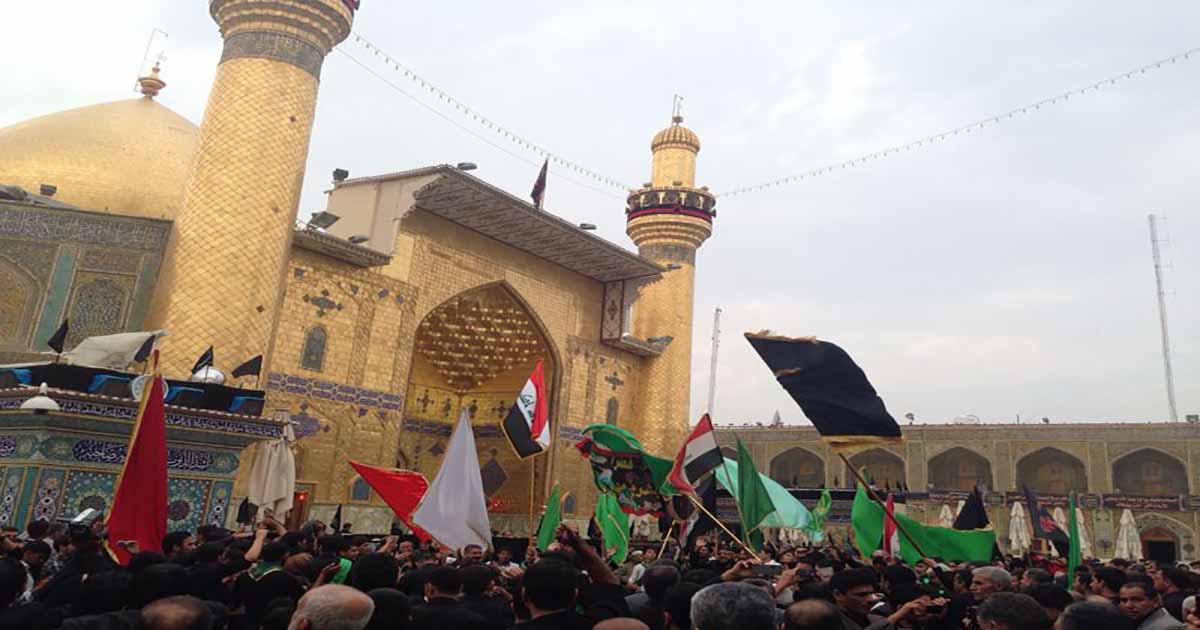In view of divine, logical and political basis of Imamah, one may wonder why then the system of Imamah could not be apparently implemented after the demise of holy prophet (S) in terms of rulership and caliphate?
Shi’as – The Followers of Imam Ali (P)
In view of these basic criteria of the ruler and leader of the Islamic society as discussed in the article, Responsibilities of an Imam , and in pursuance of what the holy Prophet said about the leadership of Imam Ali (P), a number of prominent Muslims and well-known companions of the Prophet seriously supported the selection of Ali (P) as the ruler immediately after the demise of the holy Prophet.
They believed that he alone could lead, on correct lines and to its logical end, the movement started by the Prophet and advance to a fruitful stage for the deliverance of humanity from all anti-God and anti-man tendencies.
This group of the supporters and followers of Ali (P) and the believers in the necessity of his leadership came to be known as Shi’ah.
The word, Shi’ah means a group of friends and followers. It is better if we quote the words of Imam Ali (P) in regard to the origin and interpretation of this word.
In one of his letters Imam Ali (P) says:
“This letter is from the servant of Allah – Ali, chief of believers to his Shi’ahs; and this name – Shi’ah – is the name which Allah adores, and has put it down in the Qur’an; surely one of his (Noah’s) Shi’ahs was Ibrahim (P). And you are (in fact) the Shi’ah of the Prophet Muhammad (P)”.
Note: Here the word Shi’ah has been used in the sense of a follower and the verse means that one of those who followed Noah (P) was Ibrahim (P).(see Quran 37:83)
The Qur’an says:
“One of them belonged to his Shi ah (supporters) and the other an enemy”. (Quran 28:15).
Here Shi’ah means a group of supporters.
There are certain sayings of the holy Prophet in which he referred to the Shi’ah of Ali (P).
Once he pointed to Ali (P) and said: “By Him in whose hands my life is, this man and his Shi’ah will be successful on the Day of Resurrection”. (See Reference 2)
On other occasions also the holy prophet (s) used similar expressions. Such instances have been mentioned in ancient Islamic sources such as Sawaiq al-Aluhriqah by Ibn Hajar Shafi’i and in Nihayah by Ibn Athir.
Thus the Muslims from the Prophet’s time were conversant with the idea that Ali (P) would be an Imam and would have followers who would be a model of true Muslims.
The Incident of Saqifah
After the demise of the holy Prophet while the Ali (P), his family members and some of his other companions were busy in arranging his funeral, a group of the immigrants and the native Muslims assembled at a place, Saqifah, to decide the question of leadership.
This group at last announced that Abu Bakr had been elected the ruler of the Muslim society. The Hashimites (the tribesmen of holy prophet) and some other companions refused to pledge their allegiance and openly criticized the decision.
They held that Ali (P) was superior in every respect, and the holy Prophet had already hinted at his leadership and imamat.
Imam Ali (P) himself said:
“By Allah! We are the most deserving of Caliphate, because we belong to the House of the Prophet. Among us there are people who understand the Qur’an, have enough knowledge of the Qur’an and the Sunnah and are conversant with the problems of the society. They defend the rights of the people against all violations and distribute wealth equitably. Such persons deserve to hold the reins of the government”. (See reference 3).
Some other companions of the Prophet like Salman and Abuzar made similar statements in public. (See reference 4).
But as the newly founded Islamic society was threatened by the danger of external enemies and internal hypocrites, Imam Ali (P) avoided to take action against the government and did not like to disrupt Muslim unity in those critical circumstances.
Imam Ali (P) declined to accept the proposal of Abu Sufyan to declare himself to be the caliph and start a struggle and join fighting.
Emergence of Shi’ahs
Anyhow, the question of the fitness of Ali (P) for Caliphate could not be shelved. A number of the companions of the Prophet stuck to this position. Gradually his supporters or the Shi’ah became a distinct body. Some scholars have collected, from various sources (e.g. Isabah, Usud al-Ghaba, Isti’ab) 300 names of the companions who were Shi’ah.
Foundation of Monarchy
The second caliph came to power on the basis of his nomination by the first. This added to the worry of the Hashimites and the close associates of Imam Ali (P). They apprehended that in future also, in contravention of the instructions of the Prophet, the caliphs would be appointed on the basis of their nomination by their predecessors.
The six member committee appointed by the second caliph, though it included Imam Ali (P), was formed in a way that he was left out, and Uthman was appointed to be the third caliph.
The foundation of the Umayyad power was laid in Syria during the time of the second caliph. Now as Uthman belonged to this family, the power of the Umayyads was further increased and consolidated.
The administration of several other areas of the Muslim territory was handed over to the relatives of the caliph. Gradually justice and equality of Islam gave place to discrimination and partiality, and a monarchical government was set up.
Persecution of Companions of Holy prophet (S)
These events added to the resentment of the people and strengthened the Shi’ah movement. Abuzar, the well-known companion of the Prophet was expelled from Medina because he criticized the rulers for their hoarding of money and mishandling of public property. He was continuously persecuted, till he died.
Another companion, Abdullah ibn Mas’ud, who raised his voice against the expulsion of Abuzar, earned the displeasure of the caliph. He was also harassed till his death.
At last the resentment of the people reached its boiling point. Some people revolted. Caliph Uthman was killed. Under the pressure of public opinion Imam Ali (P) became caliph. But it was too late.
Tyranny of Umayyads
The Umayyads, who were old enemies of Islam, were now appearing in the garb of the defenders of the faith and by means of their unlimited wealth and power had entrenched themselves in Syria and several other points of the Muslim territory.
Three Groups who fought against Imam Ali (P)
A new class of aristocrats having huge income had sprung up. Naturally Imam Ali (P), who was dedicated to upholding justice and equality and doing away with paganism and corruption, could not put up with this situation.
He dismissed Mu’awiyah, an Umayyad appointed by the second caliph, and restrained the aristocrats from playing with public treasury. But the resistance of the deviators and self seekers increased, and eventually three groups rose to fight against Imam Ali (P).
1. The haughty aristocrats who instigated the Battle of the Camel. They were defeated, but this conflict cost the Muslims dearly.
2. The Umayyads under the command of Mu’awiyah, the supporters of aristocratic and racist government and the revivers of despotic imperialism who caused the Siffin battle. When they were about to be defeated, they resorted to a ruse to stop fighting. Mu’awiyah was able to continue his unlawful government.
3. The foolish Pietists who during the Battle of Siffin were instigated to rise against Imam All (P). They caused the Battle of Nahrawan. During this struggle the way of Imam Ali (P) became distinct from that of others and all the good Muslims who liked him rallied round him.
Tyrannies and Massacres after Imam Ali (P)
After the martyrdom of Imam Ali (P), the field was open to the old enemies of Islam to do what they liked. The Umayyads were now masters of the whole Muslim world. They trampled on the Islamic principles and standards to the utmost possible extent.
Their tyrannies and massacres, their open violation of the Islamic laws, their hostility to the Shi’ah and the members of the Holy Family, who were the champions of Islamic justice, and above all the tragedy perpetrated by them at Karbala, and the massacre at Medina a year later, made the position of the Shi’ah extremely difficult.
Galvanization of Shi’ahs
But these events also galvanized the Shi’ah and turned them into a compact body, having as their distinctive feature two important doctrines in the Islamic and social fields.
These doctrines of Imamate and justice were derived from the Book of Allah and the sayings of the Prophet and the Shi’ah regarded their observance as a pre-requisite of being a perfect Muslim.
References
The following sources are used to prepare the above article.
1. Dr. M. H. Behishti, Dr. M. J. Bahonar, Philosophy of Islam, Islamic Seminary Publications (1984)
2. Al-Durr al-Manthur – commentary on the verse 7 of Surah al-Bayyinah – by Suyuti.
3. Al-Imamah wal-Siyasah by Ibn Qutayba
4. Ibn Abil Hadid Mo’tazali vol. 2 p. 17 and Tarikh Ya’qubi vol. 2 p. 148





0 Comments